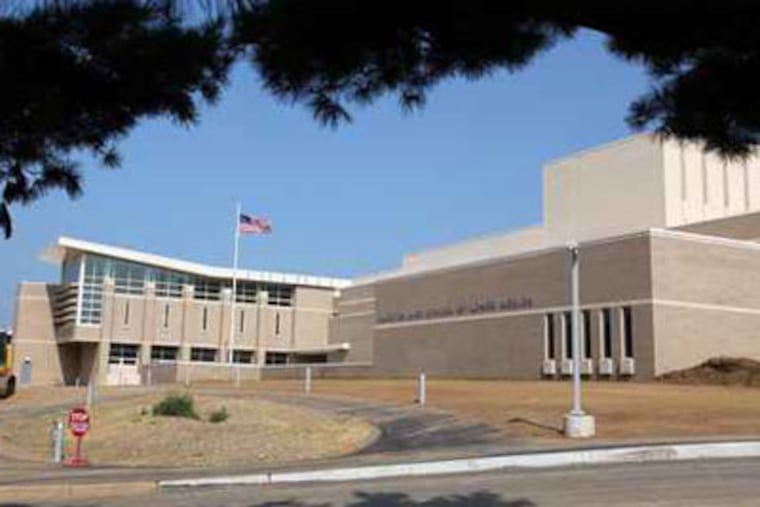There he goes ... School leaders say ‘Mr. Harriton’ title not gender inclusive
Harriton students protest being forced to change name of Mr. Harriton pageant to make it more gender inclusive.

Kids at Harriton High School still talk about the night two years ago that one of the school’s biggest jocks stood before hundreds of classmates in a leotard and 6-inch heels and danced like nobody was watching to the strains of Beyoncé’s “All the Single Ladies.”
To the majority of students in the affluent Lower Merion high school, that captured the essence of their annual “Mr. Harriton” competition – a wildly popular spoof of traditional beauty pageants in which boys sing, dance, and answer goofy questions, while raising more than $100,000 for local charities in recent years.
But this year’s competition, slated for Feb. 22, is engulfed in an unlikely controversy that’s become the talk of Harriton’s roughly 1,200 students: A demand from school administrators that sponsors change the name because, they argue, the “Mr. Harriton” tag discourages girls from entering and is thus “exclusionary.” Even LGBTQ activists say administrators are going too far.
Unrest over a proposed new name – “Mx. Harriton,” a gender-neutral honorific endorsed by an expert from the University of Pennsylvania – is the lead story on the student-run TV newscast, prompted the inevitable Facebook petition as well, and led about 25 kids to show up at Monday night’s Lower Merion school board meeting to argue for making “Mr. Harriton” great again.
Harriton is one of many high schools from coast to coast that stage male-dominated spoofs of Miss America-style pageants as a creative and often-hilarious way to make fun of ideals about gender conformity and typically raise money.
The school district says the name change is part of its work on gender inclusivity. But the controversy has flipped the script on today’s school gender wars so much that it’s Harriton’s Gender Sexuality Alliance, which advocates for LGBTQ students, that’s accusing the school of too much political correctness, by branding as anti-women an event that was created to lampoon misogyny.
“So many things are getting washed away with this hypersensitive politically correct culture that we’ve created,” bemoaned one alliance leader, 17-year-old junior Sarah Cook. She and others worry the brouhaha will tarnish this year’s event and its ability to repeat last year’s $30,000 take. “This one thing shouldn’t suffer because of that.”
But Scott Eveslage, Lower Merion’s assistant superintendent and Harriton’s former principal, insists there was growing concern that the 12-year-old event has never had a female contestant and was possibly “reinforcing some negative stereotypes about women.”
Eveslage said he found some aspects – such as when male contestants were brought on stage by female “escorts” – bothersome. “We certainly understand the intent of it was to parody,” he said, but “because an event was a parody doesn’t mean it’s not offensive.”
Harriton’s student government, which sponsors the pageant, notes that girls have never been barred from entering and that a couple of would-be female contestants have tried out in recent years, although neither made the cut to be among the 10 final contestants.
The district’s other high school, Lower Merion, was also required to change the name of its “Mr. Lower Merion” contest, even though female contestants have participated and won. It is now Amazing Ace.
Harriton student leaders said they were somewhat blindsided when school officials told them in August the “Mr. Harriton” appellation would have to go. The administrators said there’d been a couple of complaints about the name – although it remains unclear from whom – even as student surveys on Facebook this fall have shown overwhelming support for keeping it as “Mr. Harriton.”
“I have only had one person to tell me they would like the name to be changed, and that is out of a school of 1,200,” said Valentina Spadea, vice president of student council. “I’ve had plethora of texts, calls, people really trying to get me to keep this name.”
Council leaders initially tried to work with the school on a compromise. But the new name that the students preferred and argued would sound more inclusive – “Misster Harriton” – was nixed by the administrators. A suggestion for “Harriton’s Next Top Model” also foundered.
Eventually, school leaders bounced five potential new names off Jeanne Stanley, who teaches about gender and sexuality at Penn, before settling on “Mx. Harriton,” using the gender-neutral honorific.
It’s a solution that seems to have pleased few students, especially in the Gender Sexuality Alliance, whose leaders feel their group is being blamed for the controversy while insisting it had no problem with calling the show “Mr. Harriton.”
“A lot of people were confused, which turned to a little bit of hostility toward us,” said Christelle Latour, a 16-year-old junior and GSA activist. She said other students insisted, “You guys are the social justice warriors, so you guys did this.”
But administrator Eveslage said times have changed, and he compared the situation to the recent move by the Boy Scouts to alter its name. “It doesn’t change the essence of the program,” he said. “but they have changed language and titles to reinforce more a culture of inclusivity.”
Heath F. Davis, the director of Gender, Sexuality and Women’s studies at Temple University, said the trend is to move away from gendered titles but there can be times when gender-specific terms make a broader point about bias.
“You can over-correct and say, ‘Let’s make everything gender-neutral’ and get rid of all of those things,” Davis said.